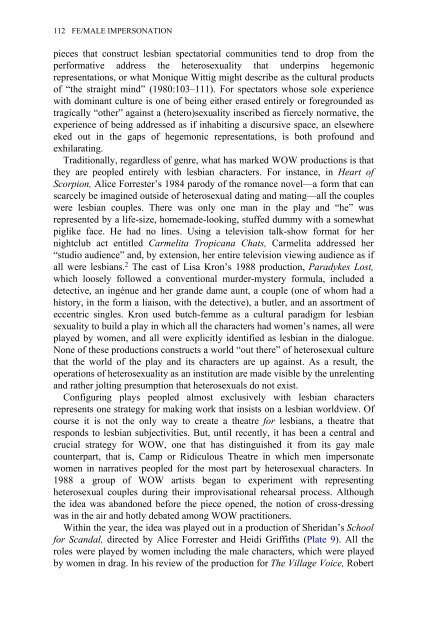Edited by Moe Meyer - Get a Free Blog
Edited by Moe Meyer - Get a Free Blog
Edited by Moe Meyer - Get a Free Blog
You also want an ePaper? Increase the reach of your titles
YUMPU automatically turns print PDFs into web optimized ePapers that Google loves.
112 FE/MALE IMPERSONATION<br />
pieces that construct lesbian spectatorial communities tend to drop from the<br />
performative address the heterosexuality that underpins hegemonic<br />
representations, or what Monique Wittig might describe as the cultural products<br />
of “the straight mind” (1980:103–111). For spectators whose sole experience<br />
with dominant culture is one of being either erased entirely or foregrounded as<br />
tragically “other” against a (hetero)sexuality inscribed as fiercely normative, the<br />
experience of being addressed as if inhabiting a discursive space, an elsewhere<br />
eked out in the gaps of hegemonic representations, is both profound and<br />
exhilarating.<br />
Traditionally, regardless of genre, what has marked WOW productions is that<br />
they are peopled entirely with lesbian characters. For instance, in Heart of<br />
Scorpion, Alice Forrester’s 1984 parody of the romance novel—a form that can<br />
scarcely be imagined outside of heterosexual dating and mating—all the couples<br />
were lesbian couples. There was only one man in the play and “he” was<br />
represented <strong>by</strong> a life-size, homemade-looking, stuffed dummy with a somewhat<br />
piglike face. He had no lines. Using a television talk-show format for her<br />
nightclub act entitled Carmelita Tropicana Chats, Carmelita addressed her<br />
“studio audience” and, <strong>by</strong> extension, her entire television viewing audience as if<br />
all were lesbians. 2 The cast of Lisa Kron’s 1988 production, Paradykes Lost,<br />
which loosely followed a conventional murder-mystery formula, included a<br />
detective, an ingénue and her grande dame aunt, a couple (one of whom had a<br />
history, in the form a liaison, with the detective), a butler, and an assortment of<br />
eccentric singles. Kron used butch-femme as a cultural paradigm for lesbian<br />
sexuality to build a play in which all the characters had women’s names, all were<br />
played <strong>by</strong> women, and all were explicitly identified as lesbian in the dialogue.<br />
None of these productions constructs a world “out there” of heterosexual culture<br />
that the world of the play and its characters are up against. As a result, the<br />
operations of heterosexuality as an institution are made visible <strong>by</strong> the unrelenting<br />
and rather jolting presumption that heterosexuals do not exist.<br />
Configuring plays peopled almost exclusively with lesbian characters<br />
represents one strategy for making work that insists on a lesbian worldview. Of<br />
course it is not the only way to create a theatre for lesbians, a theatre that<br />
responds to lesbian subjectivities. But, until recently, it has been a central and<br />
crucial strategy for WOW, one that has distinguished it from its gay male<br />
counterpart, that is, Camp or Ridiculous Theatre in which men impersonate<br />
women in narratives peopled for the most part <strong>by</strong> heterosexual characters. In<br />
1988 a group of WOW artists began to experiment with representing<br />
heterosexual couples during their improvisational rehearsal process. Although<br />
the idea was abandoned before the piece opened, the notion of cross-dressing<br />
was in the air and hotly debated among WOW practitioners.<br />
Within the year, the idea was played out in a production of Sheridan’s School<br />
for Scandal, directed <strong>by</strong> Alice Forrester and Heidi Griffiths (Plate 9). All the<br />
roles were played <strong>by</strong> women including the male characters, which were played<br />
<strong>by</strong> women in drag. In his review of the production for The Village Voice, Robert


